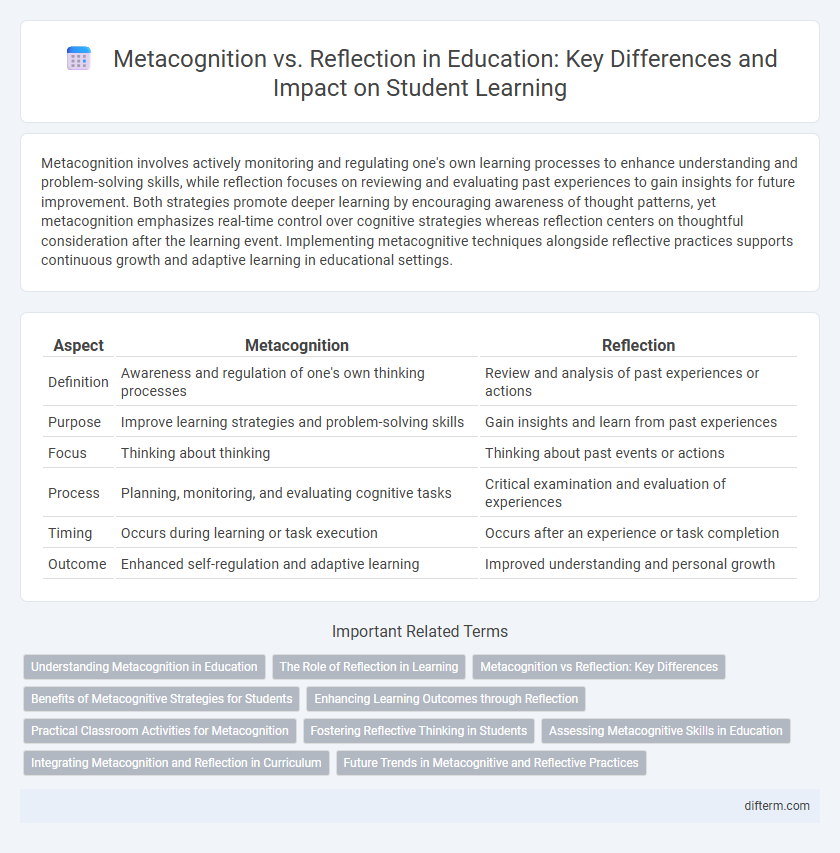Metacognition involves actively monitoring and regulating one's own learning processes to enhance understanding and problem-solving skills, while reflection focuses on reviewing and evaluating past experiences to gain insights for future improvement. Both strategies promote deeper learning by encouraging awareness of thought patterns, yet metacognition emphasizes real-time control over cognitive strategies whereas reflection centers on thoughtful consideration after the learning event. Implementing metacognitive techniques alongside reflective practices supports continuous growth and adaptive learning in educational settings.
Table of Comparison
| Aspect | Metacognition | Reflection |
|---|---|---|
| Definition | Awareness and regulation of one's own thinking processes | Review and analysis of past experiences or actions |
| Purpose | Improve learning strategies and problem-solving skills | Gain insights and learn from past experiences |
| Focus | Thinking about thinking | Thinking about past events or actions |
| Process | Planning, monitoring, and evaluating cognitive tasks | Critical examination and evaluation of experiences |
| Timing | Occurs during learning or task execution | Occurs after an experience or task completion |
| Outcome | Enhanced self-regulation and adaptive learning | Improved understanding and personal growth |
Understanding Metacognition in Education
Metacognition in education refers to the awareness and control of one's own learning processes, enabling students to plan, monitor, and evaluate their understanding effectively. It involves self-regulation strategies such as goal setting, self-questioning, and adjusting approaches based on feedback. Understanding metacognition helps educators design instructional methods that foster independent learning and critical thinking skills essential for academic success.
The Role of Reflection in Learning
Reflection plays a critical role in learning by enabling students to evaluate their understanding and identify areas for improvement, fostering deeper cognitive processing. Unlike metacognition, which broadly involves awareness and regulation of one's thinking processes, reflection specifically encourages learners to think critically about their experiences and the strategies they used. This deliberate practice enhances knowledge retention, promotes self-regulated learning, and supports continuous academic growth.
Metacognition vs Reflection: Key Differences
Metacognition involves awareness and regulation of one's cognitive processes, enabling learners to plan, monitor, and evaluate their thinking strategies. Reflection primarily focuses on reviewing past experiences to derive insights and improve future actions. The key difference lies in metacognition's active control over thought processes, while reflection emphasizes thoughtful consideration of outcomes and emotions.
Benefits of Metacognitive Strategies for Students
Metacognitive strategies empower students to actively monitor and regulate their own learning processes, enhancing self-awareness and academic performance. These techniques promote critical thinking and problem-solving skills by encouraging learners to plan, evaluate, and adjust their study methods effectively. Implementing metacognitive practices leads to improved retention, increased motivation, and greater adaptability across diverse educational challenges.
Enhancing Learning Outcomes through Reflection
Reflection fosters deeper metacognitive awareness by encouraging learners to analyze their thought processes and learning strategies, ultimately improving problem-solving skills and knowledge retention. Integrating structured reflection activities within educational settings enhances students' ability to self-assess, adapt learning approaches, and set targeted goals for improvement. Empirical studies show that reflective practices significantly boost academic performance and promote lifelong learning competencies.
Practical Classroom Activities for Metacognition
Metacognition in education involves students actively monitoring and regulating their thinking processes through strategies like self-questioning and goal setting, which empower deeper learning. Practical classroom activities for metacognition include think-aloud protocols, where students verbalize their thought process during problem-solving, and reflective journals that promote continuous self-assessment and adjustment of strategies. These techniques foster enhanced critical thinking skills and improve academic performance by encouraging learners to become more aware of how they learn.
Fostering Reflective Thinking in Students
Fostering reflective thinking in students involves encouraging metacognition, which is the awareness and regulation of one's cognitive processes, enabling learners to evaluate and adjust their strategies for more effective learning. Reflection allows students to critically analyze their experiences and deepen their understanding by connecting new knowledge to prior learning. Integrating metacognitive strategies with reflective practices enhances self-regulation, critical thinking, and long-term retention in educational settings.
Assessing Metacognitive Skills in Education
Assessing metacognitive skills in education involves measuring students' ability to plan, monitor, and evaluate their learning processes, distinct from mere reflection which tends to focus on reviewing past experiences. Effective assessment tools include self-report questionnaires, think-aloud protocols, and performance tasks that require learners to articulate their cognitive strategies and adjustments in real time. Enhanced metacognitive assessment supports personalized instruction and fosters autonomous learning by identifying specific areas where students can improve their strategic approach.
Integrating Metacognition and Reflection in Curriculum
Integrating metacognition and reflection in curriculum enhances students' self-awareness and critical thinking skills by encouraging them to actively monitor and evaluate their learning processes. Curriculum design that embeds both strategies promotes deeper comprehension and facilitates adaptive learning through structured opportunities for students to analyze their cognitive strategies and reflect on experiences. Employing tools such as reflective journals and metacognitive prompts fosters continuous improvement and supports the development of lifelong learning competencies.
Future Trends in Metacognitive and Reflective Practices
Emerging trends in metacognitive and reflective practices emphasize the integration of artificial intelligence and adaptive learning technologies to personalize student self-assessment and goal-setting. Future educational frameworks prioritize the development of metacognitive skills through immersive virtual reality environments, enabling learners to engage in real-time reflection and strategy adjustment. Research indicates that combining metacognition with reflective journaling enhances critical thinking and fosters lifelong learning competencies essential for evolving workforce demands.
Metacognition vs Reflection Infographic

 difterm.com
difterm.com